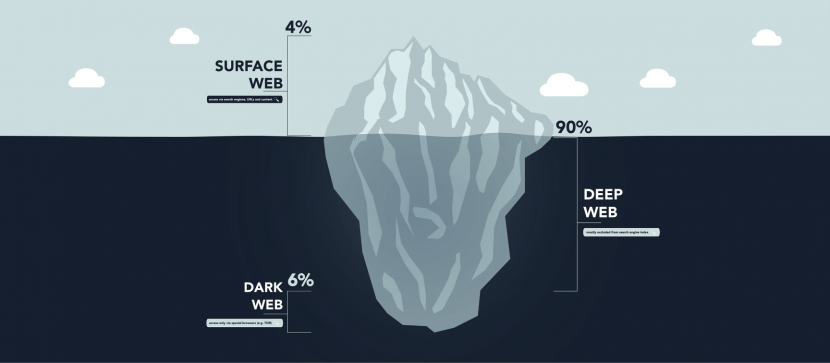The dark web is composed of an anonymous section of the web, hidden from the open web through encrypted networks. These encrypted networks, known as darknets, can only be accessed with a darknet search engine and a dark web monitoring tool to scan its contents since it’s not indexed by open web search engines like Google.
While most people are familiar with the open web and the Google Search Engine or Chrome browser, fewer know much about the dark web. That’s understandable because this anonymous part of the internet is much smaller than the size of the open web – many experts estimate it to be around 5% of the total web.
The largest network of the dark web is known as TOR (The Onion Router) and requires the TOR browser to access. However, there are other dark web networks, like I2P, Freenet, ZeroNet, and IRC. The dark web, or the TOR network to be more precise, was originally developed in the mid-1990s by the US government’s Naval Research Laboratory to allow journalists, whistleblowers, and people in oppressed nations to express themselves openly on the internet with near-complete anonymity. Today cyber criminals take advantage of its anonymity to plan and execute crimes like illicit drug transactions, human trafficking, weapons trafficking, hacking, terrorist attacks, child pornography, and more. Many of these cyber criminals on the dark web have prospered with the help of bitcoin, the digital currency that allows for anonymous transactions.
Many darknet search engines exist, but they present a number of challenges. One of the biggest challenges is that most of them don’t offer comprehensive coverage of the dark web which includes dark networks like Zeronet, I2P, and others in addition to the TOR network. Another huge challenge is that new sites, files, marketplaces, and networks are popping up on the dark web all the time, and most dark web search engines aren’t able to continuously discover them. Many only crawl data once a week.
Another challenge in accessing data on the dark web is that many do not provide the ability to search via a particular keyword or subject. For instance, say you want to only generate results related to a hacking of a particular organization? Granular filtering capabilities that identify these specific discussion threads are only typically available with advanced dark web monitoring.
Finally, the data from many dark web files, sites, and marketplaces is not easily accessed due to paywalls, logins that require username and passwords, and simply being blocked to avoid crawling by bots. Advanced dark web monitoring technology like Webz, however, is able to access these hidden, password-protected, and encrypted parts of the dark web. This ensures more comprehensive dark web coverage than public non-commercial darknet search engines or dark web search tools. It also has the advantage of being able to crawl sources on an hourly basis. This high-quality, relevant data enables organizations to gain the insights needed to identify security risks and cyber threats to businesses, brands, and ordinary citizens around the world.

